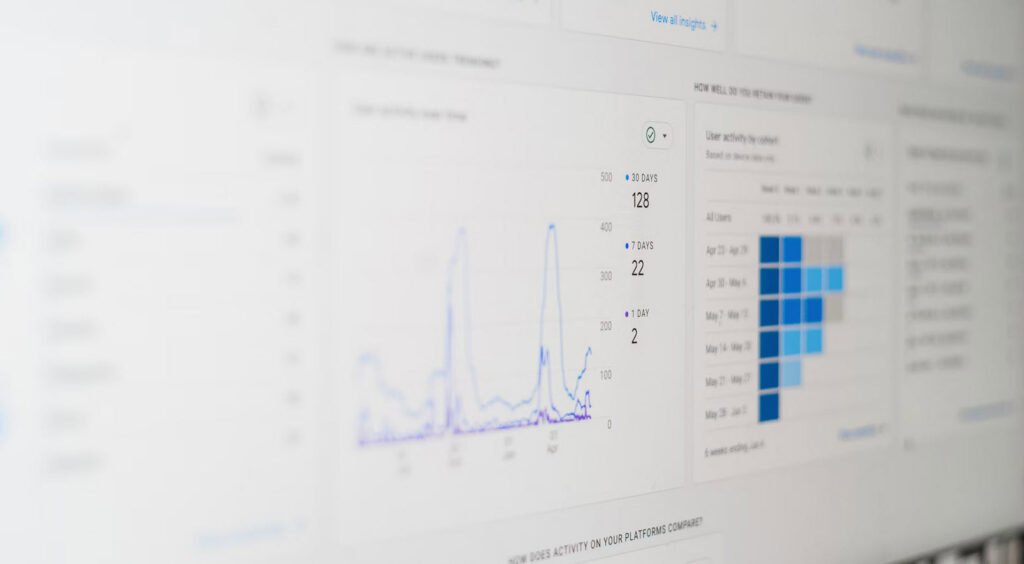Effective SEO is essential for driving traffic, enhancing online visibility, and increasing conversions. To gauge the success of your SEO efforts, it’s crucial to monitor and measure key metrics regularly.
Here are the top SEO metrics you should be tracking.
1. Organic Traffic
Organic traffic represents visitors who arrive at your website through search engine results, not paid ads. It’s a primary indicator of your site’s visibility and relevance in search engines.
Use tools like Google Analytics to track the volume of organic traffic. Monitor trends over time to assess the impact of your SEO strategies and identify seasonal patterns or shifts.
2. Keyword Rankings
Keyword rankings show how well your website ranks for specific search terms. Higher rankings typically lead to more organic traffic.
Tools like Google Search Console, SEMrush, and Ahrefs allow you to track keyword rankings. Focus on your target keywords and monitor their positions regularly to see how your SEO efforts are paying off.
3. SERP Visibility
SERP (Search Engine Results Page) visibility indicates how often your website appears in search results. Higher visibility means more chances for clicks and traffic.
Use SEO tools to analyze your SERP visibility. These tools often provide visibility scores that reflect the percentage of clicks you might receive based on your rankings.
4. Click-Through Rate (CTR)
CTR measures the percentage of users who click on your link after seeing it in the search results. A high CTR indicates that your title tags and meta descriptions are compelling and relevant.
Google Search Console provides insights into your CTR for various search queries. Identify pages with low CTR and optimize their titles and meta descriptions to improve this metric.
5. Bounce Rate
Bounce rate represents the percentage of visitors who leave your website after viewing only one page. A high bounce rate can indicate issues with page relevance or user experience.
Google Analytics tracks bounce rate for individual pages and your site as a whole. Aim to reduce bounce rates by improving content quality, site navigation, and page load times.
6. Website Authority Over Time
Website authority reflects the overall strength and credibility of your site in the eyes of search engines. Higher authority generally leads to better rankings.
Tools like Moz’s Domain Authority (DA) or Ahrefs’ Domain Rating (DR) can help track your website’s authority over time. Focus on building high-quality content and earning authoritative backlinks to boost this metric.
7. Backlinks
Backlinks from reputable sites signal to search engines that your content is valuable and trustworthy. They play a crucial role in improving your search rankings.
Use backlink analysis tools to monitor the number and quality of backlinks to your site. Track new backlinks and assess the authority of the linking domains.
8. Page Speed
Page speed affects user experience and search rankings. Faster-loading pages tend to have lower bounce rates and higher engagement.
Tools like Google PageSpeed Insights, GTmetrix, and Pingdom provide detailed reports on page load times and suggestions for improvement. Aim for a load time of under three seconds.
9. Engagement Time
Engagement time, or average session duration, measures how long visitors stay on your site. Higher engagement indicates that users find your content valuable and relevant.
Google Analytics tracks average session duration. Analyze pages with high engagement and replicate their success across other areas of your site.
10. Conversion Rate
Conversion rate measures the percentage of visitors who complete a desired action, such as making a purchase or filling out a contact form. It directly reflects the effectiveness of your SEO in driving business goals.
Use Google Analytics or other conversion tracking tools to monitor conversion rates for different pages and traffic sources. Optimize your site’s content and user experience to improve this metric.
Conclusion
Measuring these key SEO metrics helps you understand the effectiveness of your SEO strategies and identify areas for improvement. By regularly tracking organic traffic, keyword rankings, SERP visibility, CTR, bounce rate, website authority, backlinks, page speed, engagement time, and conversion rate, you can make data-driven decisions to enhance your site’s performance and achieve your business goals.
Effective SEO is a continuous process, and monitoring these metrics ensures you stay on the right track.




Pingback: Top 12 Essential SEO KPIs That Every Business Should Monitor - Tech Hyme
Pingback: Top Fundamental Aspects of SEO That You Need to Understand - Tech Hyme